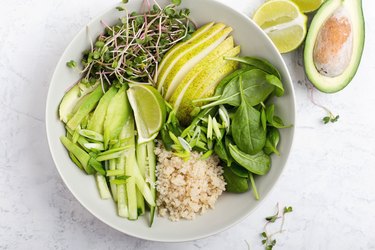
With a never-ending wave of new gluten-free foods and a lot of chatter about the purported health benefits of a gluten-free diet, it's easy to think you should take gluten off your plate.
And let's be clear: People who have celiac disease absolutely need to remove gluten from their diets — for good. But if you do not have celiac, a wheat allergy or gluten sensitivity, nixing gluten isn't necessary, and likely isn't beneficial to your health. Here's what you need to know.
Video of the Day
Video of the Day
What Is Gluten, Anyway?
Gluten is an umbrella term for a group of proteins that are found in starches like wheat, barley and rye, per the Celiac Disease Foundation.
These proteins lend structure and shape to classic carbohydrates like fluffy loaves of bread and airy pastries. Gluten is the reason you can stretch and knead dough without it ripping apart, per the Harvard T. H. Chan School of Public Health.
But if you're seeking to avoid gluten, it's not just a matter of avoiding bread, pizza and other baked goods. Gluten is also found in many processed foods, including cereal, salad dressing, soup and soy sauce, according to the Mayo Clinic.
Who Should Go Gluten-Free?
Here are the two main factors that necessitate following a gluten-free diet:
Celiac Disease
With this autoimmune disorder, a person's body see gluten as a foreign invader, and attempts to fight it off.
This immune response occurs in your small intestine, per the Cleveland Clinic. The antibodies produced by your body in response to gluten cause damage to the walls of the small intestines, which in turn leads to an inability to absorb nutrients.
Celiac disease can cause an array of symptoms, including all sorts of GI issues — such as diarrhea, gas, bloating and stomach pain — as well as other symptoms, including anemia, headaches, fatigue, joint pain and osteoporosis, according to the Cleveland Clinic.
Tip
If you suspect you may have celiac disease, do not eliminate gluten from your diet ahead of a diagnostic blood test. That blood test checks for antibodies released by the body in response to gluten. If you’ve already banned gluten from your plate, the test won’t be able to pick up the abnormal immune response that occurs in celiac disease.
Gluten Intolerance
Individuals with non-celiac gluten sensitivity (NCGS) — also known as gluten intolerance — don't experience an autoimmune response to gluten. Instead, these people experience symptoms, including joint pain, bloating, brain fog or nausea, after eating foods with gluten, per the Cleveland Clinic.
Unlike celiac disease, there's no test for this intolerance. Diagnosing it usually requires following an elimination diet.
While those with diagnosed celiac disease must eliminate gluten entirely and indefinitely, people with NCGS may tolerate gluten in small amounts, as it's a sensitivity, not an allergy. Just cutting down (and not eliminating) gluten can ease symptoms, per Northwest Medicine.
What About Wheat Allergies?
Some people are allergic to wheat, experiencing allergic symptoms including skin rash, headache or sneezing when they eat it, per Johns Hopkins Medicine. They can still eat barley and rye and are not allergic to gluten. Some may still choose to follow a gluten-free or mainly gluten-free diet to avoid wheat.
4 Drawbacks of Going Gluten-Free if You Don’t Have Celiac Disease
While only 1 percent of people are diagnosed with celiac disease, many more opt to eat a gluten-free diet, per a July 2019 paper in the Journal of Nutrition and Metabolism. (A gluten intolerance is more common, affecting an estimated 6 percent of people in the U.S., according to the Cleveland Clinic.)
Yet outside of a true celiac disease diagnosis and NCGS, there's little reason to follow a gluten-free diet for the sake of health. Here are some of the drawbacks of going gluten-free without medical grounds:
1. You Could Miss Out on Key Nutrients
Some gluten-free products are lower in critical nutrients like magnesium, folate, vitamins D and B12, as well as calcium, zinc and iron, according to a December 2016 study in Clinical Nutrition.
Gluten-containing whole grains are a key source of B vitamins, says Chella Po, RDN, registered dietitian and founder of Better Being Nutrition Coaching. "B vitamins help convert food into energy," Po says. "Folate is a B vitamin that plays a role in red blood cell production and DNA synthesis, while vitamin B6 supports the production of neurotransmitters."
Unnecessarily banning gluten from your plate can also cut out opportunities to get iron and magnesium. "Iron is needed to produce red blood cells and transport oxygen in the body," Po says. "And magnesium is needed for muscle, nerve and bone health, as well as energy production."
Translation: Going gluten-free without reason might make your diet less nutrient-dense, not more.
2. You Might End Up Eating More Sugar, Salt and Fat
Many people resort to a gluten-free diet in the hopes that they'll lose weight. But removing gluten-rich foods isn't necessarily the best path to follow to shed pounds. Indeed, many gluten-free foods serve up an abundance of added salts, saturated fats and added sugars to make up for the mouthfeel of the missing gluten.
"Adding salt, sugar, fat or other thickeners and emulsifiers can help to improve the texture and taste of a food, but don't necessarily make for a healthier product," Po says. "Gluten-free versions of foods often end up more highly processed, with more of the very ingredients that we generally recommend [minimizing] for good health."
3. You’ll Cut Out Heart-Healthy Foods
In addition to missing out on the nutrients mentioned above, a gluten-free diet can be low in cholesterol-lowering dietary fiber on account of its exclusion of whole grains like whole-wheat bread, wheat bran, farro and hulled barley, to name a few.
"Barley is one of the best sources of soluble fiber, which lowers 'bad' LDL cholesterol by binding to it in the gut and thereby keeping it out of our bloodstream," Po explains. "It also helps to lower blood sugar levels by slowing digestion and preventing damage to the blood vessels."
Indeed, a May 2017 paper in BMJ that studied around 100,000 people over 26 years found folks who ate less gluten (but didn't have celiac disease) ate fewer healthy whole grains, which is associated with an increased risk for heart disease over time. The researchers concluded that people who can tolerate gluten should continue eating nutrient-dense, gluten-containing foods for optimal cardiovascular health.
4. You May Increase Your Intake of Additives
"Gluten gives food its elasticity, structure and chewy texture," Po says. "The proteins help bread rise and [also serve] to thicken and stabilize foods."
So without gluten, a food may be more dense, gummy or crumbly. As a result, manufacturers often add ingredients to gluten-free products to improve their texture and taste. Gums like guar and xantham gum are common additives in gluten-free foods.
"In general, research shows [these ingredients] are safe for consumption," Po says, in part because the amount used in food products tends to be minimal. Indeed, "gums contain soluble fiber and some studies have even looked at the health benefits of this additive," Po notes.
Reactions to food additives are "rare but real," per the American Academy of Allergy, Asthma and Immunology. Po says gastrointestinal side effects like diarrhea, increased frequency of bowel movements, bloating and gas may occur if you're sensitive to these ingredients, but typically only when you eat them in large quantities.
The Bottom Line
Chances are you'll feel better when first starting a gluten-free diet, even if you don't have celiac disease or NCGS. But that newfound feeling of wellness may very well be due to the simple fact that you're eating fewer simple carbs and sweets — and not due to removing gluten.
"For the majority of the population, gluten-containing foods are actually nutrient-rich and provide many health benefits, not to mention they are also delicious," Po says. Plus, whole food sources of gluten are "often more nutritious, full of vitamins and minerals, less processed and made with fewer additives than gluten-free substitutes."
The takeaway: People without diagnosed celiac disease or NCGS should emphasize low-sugar, high-fiber carbohydrates before swearing off gluten altogether.
- Clinical Nutrition: "Gluten Free Diet and Nutrient Deficiencies: A Review"
- BMJ: "Long Term Gluten Consumption in Adults Without Celiac Disease and Risk of Coronary Heart Disease: Prospective Cohort Study"
- Journal of Nutrition and Metabolism: "A Gluten-Free Diet, Not an Appropriate Choice Without a Medical Diagnosis"
- Celiac Disease Foundation: “What is Gluten?”
- Harvard T.H. Chan School of Public Health: "Gluten: A Benefit or Harm to the Body?"
- American Academy of Allergy Asthma and Immunology: "Allergic to the Fine Print: Food Allergy to Additives, Rare but Real"
- Cleveland Clinic: "Celiac disease"
- Cleveland Clinic: "Gluten Intolerance"
- Johns Hopkins Medicine: "Gluten-Free Diet: Is It Right for Me?"
- Northwest Medicine: "Celiac Disease vs. Gluten Intolerance (Infographic)"
- Mayo Clinic: "Gluten-free diet"





